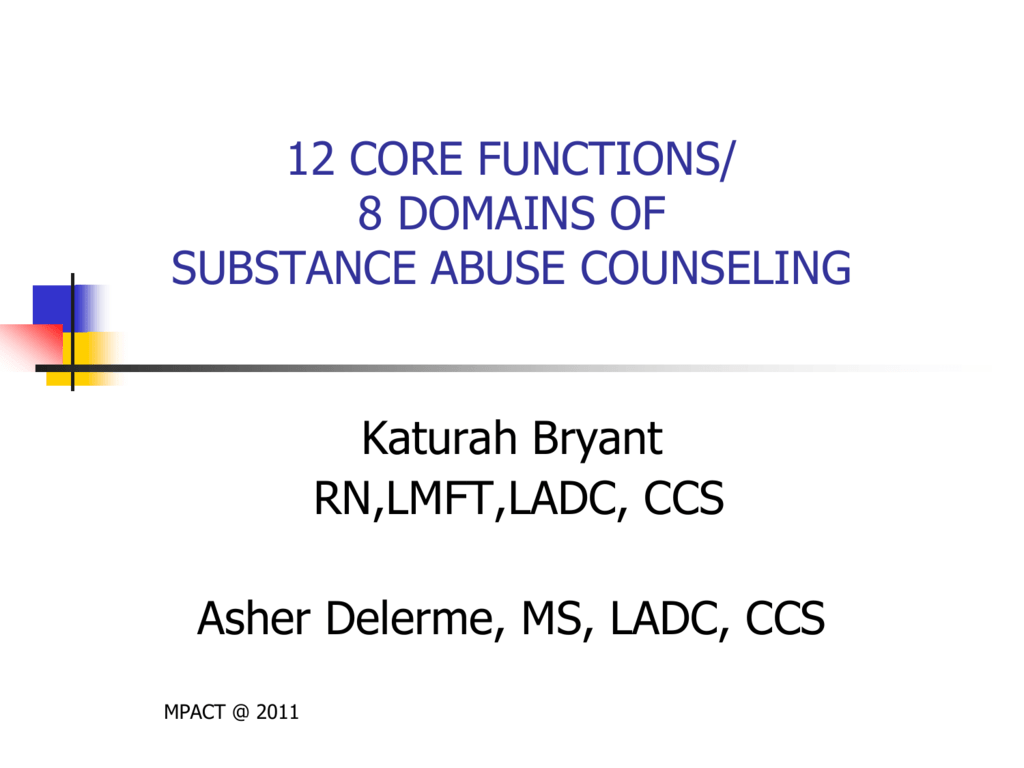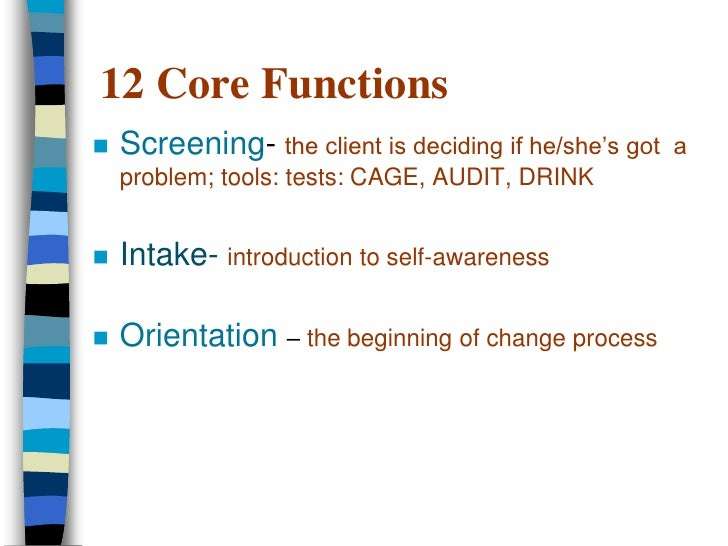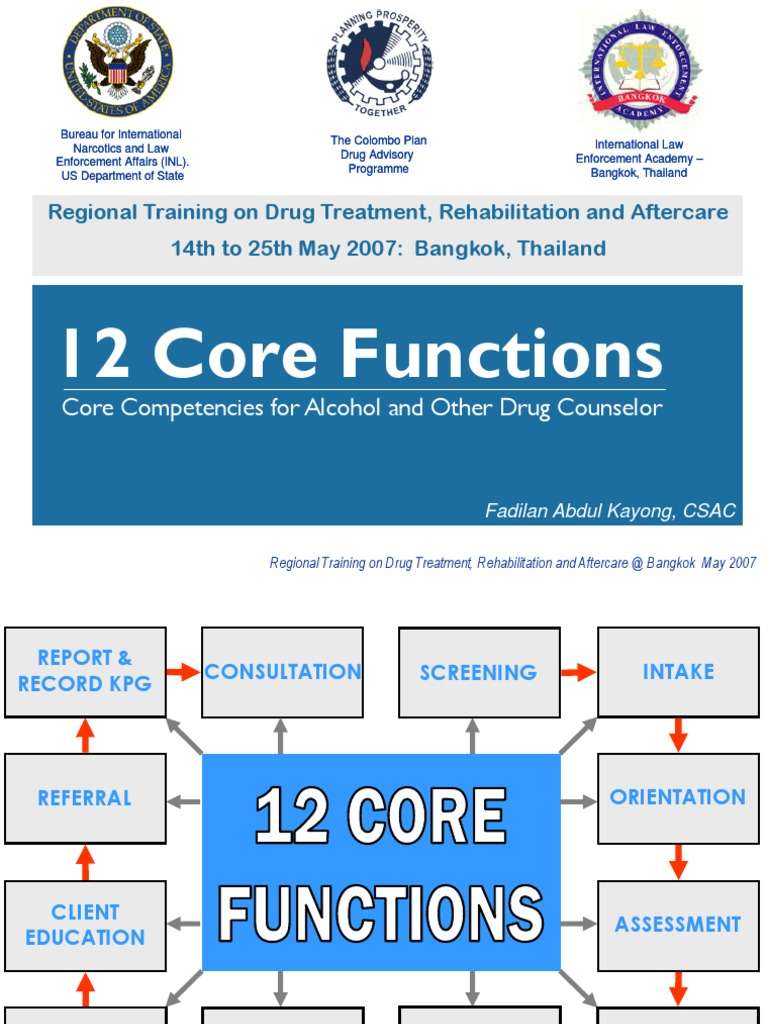What Are The 12 Core Functions Of A Substance Abuse Counselor
The following is a simplified explanation of each of the core functions of counseling.
1. Screening: This is the initial evaluation stage, during which a potential patients physiological, psychological, and social symptoms of substance abuse are evaluated. The clients need and eligibility for treatment is assessed, and based these and other factors, a counselor will decide whether or not to admit the patient for treatment.
2. Intake: For all intents and purposes, this can be seen as an extension of the screening stage. During this process, the decision to admit the patient is documented extensively and made official.
3. Orientation: These first three core functions of addiction counseling may not be exact in order the orientation stage may take place before, during, or after the screening and intake stages. The main goal of orientation is to familiarize the client with the general rules and goals of the counseling program, and what the client can and should expect over the course of treatment.
4. Assessment: Moving on to the next stage of the 12 core functions of a substance abuse counselor, this is when the counselor/patient relationship really begins. In this stage, the counselor works with the patient to gather his history, relating but not limited to any problems with substance abuse. This information-gathering can take the form of interviews, testing, and review of patient records.
Agencies Have Different Requirements
Eligibility requirements differ between agencies and programs. Criteria usually examine the patients age, gender, legal status, income, and more. If a counselor deems an individual eligible for treatment, but he/she does not fit the parameters of the program, the professional should be able to suggest an alternative location.
The global screening criteria for drug and alcohol counselors includes all of the above, plus familiarity with and adherence to laws and regulations. Counselors should be familiar with local, state, and federal policies regarding their services.
Core Functions Of Addiction Treatment
Lindsay is a healthcare writer who covers a number of topics including those that surround addiction and recovery, sleep disorders, and stress, among others.
What are the 12 core functions of addiction treatment and how do these relate to you as a patient or the loved one of a patient?
Also Check: Why Am I Addicted To Masturbating
Report And Record Keeping
The eleventh core function flexes your administrative skills. Recording and charting the results of assessment and treatment are vital to establishing working techniques and improving your ability to meet the needs of your clients. Youll be responsible for analyzing relevant information to write reports and progress notes, discharge summaries, and other client-related data.
Keeping Records And Reporting

The results of treatment must be carefully documented and recorded. This is done to track patient progress and develop plans for the patients future. While reports, notes, discharge summaries, and other types of information must be kept confidential, it should also be properly tracked. This helps to identify where the patient has improved and in which areas they still require further treatment.
You May Like: How To Treat Xanax Addiction
What Is Treatment Planning
When treating a client, the therapist tailors the use of available treatment resources to the degree feasible to the clients particular objectives and requirements. Treatment planning is an ongoing activity. The development of tailored treatment plans requires a comprehensive multidimensional assessment.
Core Functions: The Core Function Called Counseling
February 9, 2017 by Keisha Mclean-Green
Last Updated on February 9, 2017 by Morris Green
Its the bread and butter of a substance abuse counselors job. Its the major component of their clients treatment plans that leaves a lasting impact. Its the sixth core function, and its called Counseling. According to Dictionary.com, counseling is a noun and a verb meaning to give professional guidance with the goal of resolving personal conflicts and emotional problems. But for counselors working with clients recovering from addiction, its so much more.
Also Check: Can You Be Addicted To Alcohol
Core Functions Of A Substance Abuse Counselor
Substance abuse screening can help you determine where you need help to recover successfully.
If you are seeking information about substance abuse counselors, you may have heard of the 12 core functions of a substance abuse counselor. Note that these core functions are not the same as the 12 step treatment programs you may be familiar with. Rather, the core functions of addiction counseling have been set in place as a standard for counselors to use in their practice, and as a way for them to be held responsible and accountable for their work. These are the steps and processes that a counselor must adhere to with every single patient they see.
What Are The 12 Core Functions Of A Drug And Alcohol Counselor
Drug and alcohol counselors may be the only chance some addicts have toward a life free from substance abuse. The counselors serve as leaders and supporters, even when no one else does. They impart knowledge and help addicts build a specific plan to overcome dependency based on individual needs. Without drug and alcohol counselors, many would never be free from their addictions.
Drug and alcohol counselors work in a delicate environment where their words can profoundly affect the lives of their clients. Each professional must perform 12 different core functions to be effective and successful.
You May Like: What Does Opioid Addiction Look Like
Understanding The Core Functions Of Counseling Will Make You A Better Patient
So, what does all this information have to do with you? Youll be happy to know that, as a potential patient, its not necessary that you memorize and fully understand these core functions of counseling. That being said, by at least familiarizing yourself with these standards, you can be more proactive in your search for a substance abuse counselor and in your treatment in general. Knowing these 12 core functions of a substance abuse counselor will help you to understand whats going on over the course of your treatment, and it will allow you to ask the right questions of your counselor and to be an active and engaged participant throughout your entire treatment process.
Substance Abuse Counselor
What Are 4 Causes Of Drug Abuse
Recommended Reading: How To Treat Addictive Personality
Twelve Core Functions Of The Addiction Counselor Tap21
The twelve core functions of an addiction counselor are:
I. Screening: Determining whether the client appropriate and eligible for admission to the program.
II. Intake: Completing admission, assessment and other program forms, releases of information, and assigning a primary counselor to the client.
III. Orientation: Describing to the client the goals of the program rules of conduct and infractions that can lead to disciplinary action or discharge from the program.
IV. Assessment: Identifying and evaluating an individuals strengths, weaknesses, problems and needs in order to develop a treatment plan. This usually results from a combination of focused interviews, testing and/or record reviews.
V. Treatment Planning: Identifying and ranking problems needing resolution establishing agreed-upon immediate and long-term goals and deciding upon a treatment process and the resources to be utilized. A written treatment contract is based on the assessment and is a product of a negotiation between the client and the counselor to assure that the plan is tailored to the individuals needs.
VI. Counseling: Basically, the relationship in which the counselor helps the client mobilize resources to resolve his or her problem and/or modify attitudes and values.
VII. Case Management: Knowing how to bring outside services, agencies, and resources to assist the client to recovery and attain other goals of the treatment plan.
Tap21 8 Practice Domains And 12 Core Functions And Competencies Of Addiction Counseling

The City Vision University Addiction Counseling program offers a full range of instruction on the skills necessary to succeed as a licensed addiction counselor.
These skills are defined by the Substance Abuse and Mental Health Services Administration in a publication often known as TAP 21. This is a Technical Assistance Publication entitled Addiction Counseling Competencies: The Knowledge, Skills, and Attitudes of Professional Practice, which can be downloaded from .
After you have receive a BS or a certificate in Addiction Counseling from City Vision University, you will still need to follow the steps necessary to get licensed by your states accreditation board. Most states require at least 180 hours of training to satisfy the instructional requirement for licensure typically you will simply need to supply a transcript of completed coursework, and, at most, the syllabi of the courses which you took.
City Vision has collected resources for you on how to become a certified addiction counselor in your state. Send an email to info@cityvision.edu if you need assistance with this process.
Note that if you have already completed an initial course of study in addiction counseling, any of the courses listed below should count as 45 CEUs , since each provides 3 academic credits. Most states require 40 CEUs every two years, though some require the ethics course in person.
| Eight Practice Domains |
Don’t Miss: How To Save An Addict
What Is The Role Of A Counselor In Family Therapy
Help the client, family, or group understand problems and the consequences of their actions by using strategies.Utilize approaches to assist the client, family, or group in examining their own behaviors, attitudes, and feelings, among other things.Individualize therapy based on differences in culture, gender, age, and way of life, among others.
Obtaining solutions and decisions from the client is essential.
What Does A Counsellor Do
Counselors are in charge of taking notes, writing reports, and keeping track of any other information pertaining to a patients condition. 12. Consultation with other professionals on the treatment or services provided to clients: It is possible that many patients may underestimate the importance of the final of the four main roles of counseling.
You May Like: What Are The Signs Of Addiction
The 12 Core Functions Of A Substance Use Counselor
Sponsor: NH Alcohol & Drug Abuse Counselors Association
PRESENTATION: This training includes a comprehensive and detailed study of application both in documentation and treatment of the 12 Core Functions of a Substance Use Counselor. Emphasis will be on the 12 core functions, the assessments BPS and ASI, entry level diagnosis, SMART treatment planning, and exceptions to confidentiality. This course is designed to give participants a solid understanding of the 12 Core Functions and the 46 Global Criteria as well as the basic documentation required of the substance use counselor. By the end of this training participants will be able to:
Understand and Describe the 12 Core Functions and 46 Global Criteria of Addiction Counseling.
Describe the application of the Core Functions and Global Criteria in clinical practice.
Articulate Ethical and Confidentiality Issues which confront the substance use counselor.
Define Screening and Assessment and how they are different as well as common tools.
Understand the diagnostic criteria for substance use disorders.
Discussion of a comprehensive Bio-psycho-social Assessment by applying the Diagnostic Statistical Manual to determine if a client is appropriate for SUD treatment.
Discussion of a Treatment Plan that is appropriate to the clients needs and wants, strengths and weaknesses .
Discuss the principles of Evidence-Based addiction treatment.
The 12 Core Functions Of The Substance Abuse Counselor
This Eighth Edition returns to teaching the 12 Core Functions of the Substance Abuse Counselor. The 12 Core Functions are the activities that substance abuse counselors do in their practice of counseling. This Eighth Edition continues to include instructor lesson plans and student quizzes. It is designed to assist instructors in preparing students seeking certification as alcohol and other drug abuse counselors. Performing the 12 Core Functions competently is necessary, important and critical for the protection of the public, individual clients and counselors.
Global Criteria: The 12 Core Functions of a Substance Abuse Counselor: Eighth Edition is valued by both professors in counselor training programs and clinical supervisors in treatment programs. Not only do the chapters have lesson plans for instructors, but includes quizzes with answers in Appendix A and Sample Forms in Appendix B.
ISBN13: 978-0-9768341-8-2
Don’t Miss: How To Make An Addict Get Help
What Are The 12 Core Functions Of Counseling
8:00 a.m. WELCOME AND INTRODUCTIONS ARE MANDATORY. AT 8:45 am, an overview of the 12 ESSENTIAL FUNCTIONS OF COUNSELING is presented. The following services are provided: intake, initiation, assessment, treatment planning, counseling, case management, crisis intervention, client education, referral, report-writing and record-keeping, consultation, and consultation.
Core Function: #6 Counseling
Counseling is the utilization of special skills to assist individuals, families, or groups in achieving objectives through exploration of a problem and its ramifications examination of attitudes and feelings consideration of alternative solutions and decision-making.
Criteria include selecting the counseling theory that apply apply techniques to assist the client, group, and/or family in exploring problems and ramifications apply techniques to assist the client, group, and/or family in examining the client’s behavior, attitudes, and/or feelings if appropriate in the treatment setting individualize counseling in accordance with cultural, gender, and lifestyle differences interact with the client in an appropriate therapeutic manner elicit solutions and decisions from the client and implement the treatment plan.
Recommended Reading: What Makes Video Games Addictive
What Are The 8 Practice Dimensions Of Addiction Counseling
Participants will become familiar with the eight practice dimensions that are important for effective performance as an addictions counselor throughout the course of the training: Clinical evaluation, treatment planning, referral, service coordination, counseling, client, family, and community education, documentation, and professional and ethical standards are all part of the job description.
What Are The 1212 Core Functions Of A Social Worker

12 Fundamental Functions 1 Analyze the signs and symptoms of alcoholism and other substance usage, including their psychological, social, and physiological manifestations 2 Determine if the client is eligible for admission or referral and whether he or she is a suitable candidate.3 Recognize any co-occurring problems that may exist, such as medical, mental, physical, and so on.There are more items.
Also Check: Can You Get Addicted To Lexapro
Consultation With Other Professionals
A substance abuse counselors ultimate goal is to ensure their clients receive comprehensive, quality care. Consultation with in-house and out of house professionals can become an intricate and vital element of care. Your ability to recognize issues beyond your knowledge base or skill and then identify and consult with the appropriate resources and professionals will be critical to your success and your clients wellbeing.
The 12 core functions create the blueprint to effective substance use treatment. Learning the details of each is fundamental to your career. In the coming weeks, well be talking in depth about each one. Be sure to subscribe or follow us on and to keep up!
Virtual: The 12 Core Functions Of A Substance Use Counselor
Sponsor: New Hampshire Alcohol & Drug Abuse Counselors Association
PRESENTATION: This training includes a comprehensive and detailed study of application both in documentation and treatment of the 12 Core Functions of a Substance Use Counselor. Emphasis will be on the 12 core functions, the assessments BPS and ASI, entry level diagnosis, SMART treatment planning, and exceptions to confidentiality. This course is designed to give participants a solid understanding of the 12 Core Functions and the 46 Global Criteria as well as the basic documentation required of the substance use counselor. By the end of this training participants will be able to:
Understand and Describe the 12 Core Functions and 46 Global Criteria of Addiction Counseling.
Describe the application of the Core Functions and Global Criteria in clinical practice.
Articulate Ethical and Confidentiality Issues which confront the substance use counselor.
Define Screening and Assessment and how they are different as well as common tools.
Understand the diagnostic criteria for substance use disorders.
Discussion of a comprehensive Bio-psycho-social Assessment by applying the Diagnostic Statistical Manual to determine if a client is appropriate for SUD treatment.
Discussion of a Treatment Plan that is appropriate to the clients needs and wants, strengths and weaknesses .
Discuss the principles of Evidence-Based addiction treatment.
Read Also: Can You Be Addicted To Tramadol
Tip 4: Managing Depressive Symptoms In Substance Abuse Clients During Early Recovery
This guide helps substance use counselors treat clients with symptoms of depression and substance use conditions. Program administrators will learn how to integrate depression treatment into early drug treatment. The guidelines cover screening, assessment, treatment, counseling, cultural competence, and continuing care.
How To Best Guide Clients
The global criteria of counseling focuses on best practices. Your ability to best match a program or service to the needed counseling techniques will be vital. According to the Twelve Core Functions of the Alcohol and Other Drug Abuse Counselor, as you embark, you can expect to
- Select the best counseling theory that apply to your client.
- Apply the needed technique to best assist an individual, a group, or a family in exploring specific problems by zeroing in on cause and effect.
- Apply a technique designed to assist an individual, a group, or a family in examining behaviors, attitudes, and feelings.
- Tailor individualized counseling to meet cultural, gender, and lifestyle differences.
- Interact with your client in the best and appropriate therapeutic manner.
- Prompt solutions and decisions from your client.
- Implement an appropriate treatment plan.
Its important to understand that counseling is used to develop a therapeutic relationship. One of the greatest challenges you will face as a counselor is identifying and maintaining professional boundaries. Your goal will be to help your clients resolve their problem. Resolutions will be as unique as each person you counsel, and it will fall to you to help them find and utilize the available and appropriate resources to achieve their goals. You can expect to use a wide range of methods, including:
- Client-Centered Therapy
- Strategic Family Therapy
Don’t Miss: What Is The Definition Of Addiction
